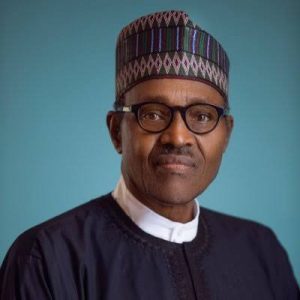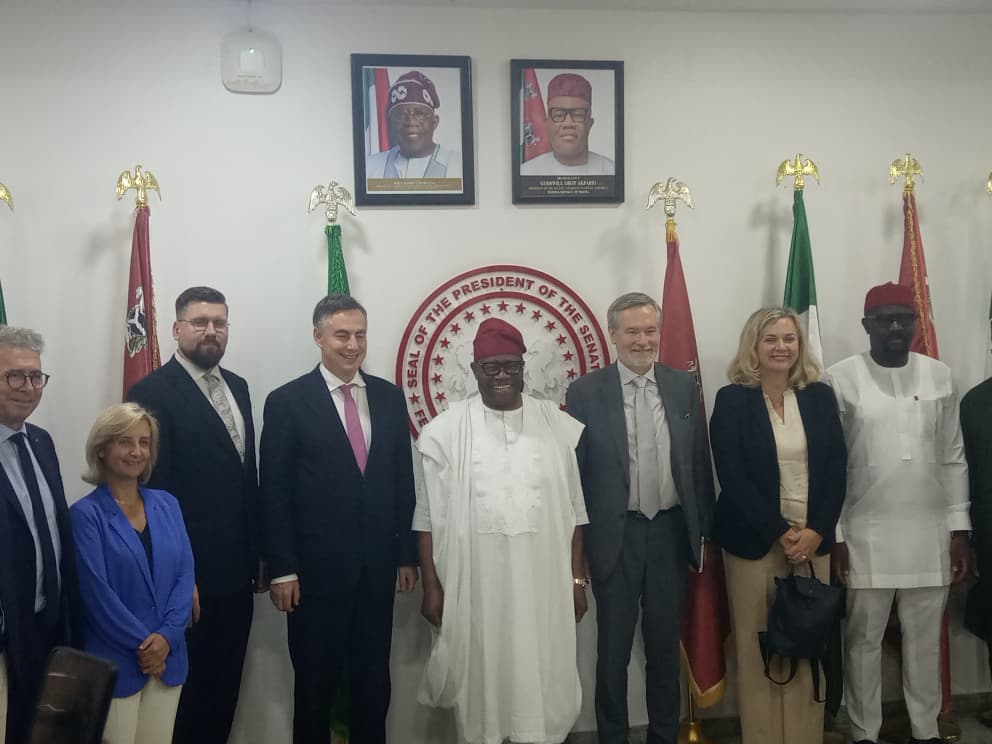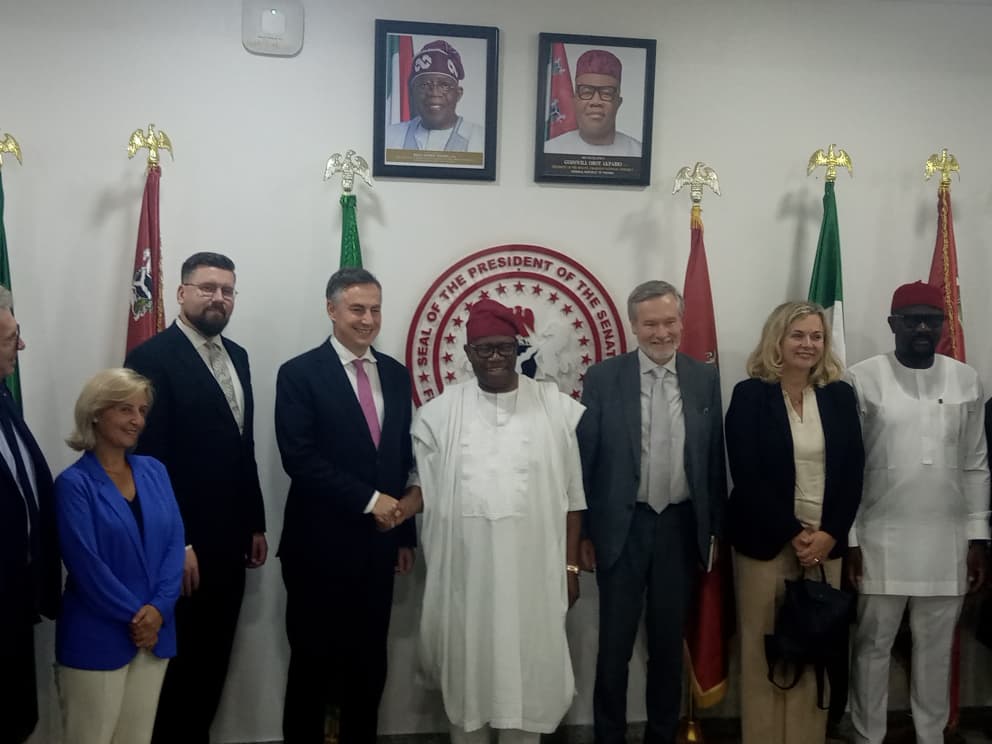Economy
Buhari to CBN: Don’t give Kobo for food, fertilizer imports
President Muhammadu Buhari on Thursday ordered the Central Bank of Nigeria ”not to issue a kobo” of the country’s reserves for the importation of food items and fertilizer.

Malam Garba Shehu, one of the President’s spokesmen, in a statement in Abuja on Thursday, said the president gave the order at a meeting of the National Food Security Council at the State House, Abuja.
According to the president, the order has become imperative as the Federal Government rolls out the Economic Sustainability Plan and sets goal for National Food Security.
Buhari restated his earlier verbal directive to the apex bank, saying he would pass it down in writing that ”nobody importing food should be given money.”
While emphasizing the need to boost local agriculture, the president said:
”From only three operating in the country, we have 33 fertilizer blending plants now working.
”We will not pay a kobo of our foreign reserves to import fertilizer. We will empower local producers.”
He also directed that blenders of fertilizer should convey products directly to state governments so as to skip the cartel of transporters undermining the efforts to successfully deliver the products to users at reasonable costs.
The president advised private businesses bent on food importation to source their foreign exchange independently.
”Use your money to compete with our farmers instead of using foreign reserves to bring in compromised food items to divest the efforts of our farmers.
”We have a lot of able-bodied young people willing to work and agriculture is the answer. We have a lot to do to support our farmers,” he said.
The meeting, chaired by the President with other key members of the Council in attendance, was briefed on the food security situation prevailing in the country.
Notably, the Vice Chairman of the council and Governor of Kebbi, Atiku Bagudu, the Chief of Staff to the President, Prof. Ibrahim Gambari and a Governor from each of the six geo-political zones – Jigawa, Plateau, Taraba, Ebonyi, Lagos and Kebbi, made presentations.
The Minister of Finance, Budget and National Planning, Dr Zainab Ahmed, outlined measures introduced by the administration to tackle the unprecedented challenges from the COVID-19 pandemic on the nation as contained in the Nigerian Economic Sustainability Plan (NESP).
Among others, the minister highlighted that the government would facilitate the cultivation of 20,000 to 100,000 hectares of new farmland in every state and support off-take of agro-processing to create millions of direct and indirect job opportunities.
She also listed the creation of 774,000 direct jobs for a minimum of 1,000 young Nigerians in each local government and the construction of 300,000 homes every year to give a boost to jobs through the construction industry.
The minister said arrangements had reached advanced stage to provide 25 million new users of electricity with the installation of Solar Home System (SHS) targeting five million households.
Ahmed also briefed on the joint investment with the World Bank to provide intervention fund to states to improve health infrastructure.
She said to ease existing financial hardships among the people, ”the government is also coming up with low-interest loans for mechanics, tailors, artisans, petty traders and other informal business operators.”
The minister added that the federal government would equally provide support to Micro, Small and Medium Enterprises (MSMEs) to help them keep their employees and boost local manufacturing.
She explained that from the recently approved N2.3 trillion stimulus recommended by the NESP, there would be expansion of broadband connectivity to boost job opportunities in the digital economy.
Ahmed said it would also involve a planned expansion of the National Social Investment Programmes including increase in the number of beneficiaries such as the cash transfer beneficiaries, N-Power Volunteers, the Market Moni and Trader Moni schemes.
In his presentation, the Minister of Agriculture, Alhaji Sabo Nanono, told the Council that ”the nation expects a bumper harvest of food items despite floods in the north and drought in the south”.
He quoted the latest market surveys to show that the recent hike in the price of commodities was being reversed.
On his part, Mr Boss Mustapha, the Secretary to the Government of the Federation and Chairman of the Presidential Task Force on COVID-19, reported the negative impact of the pandemic on the lives and livelihood of citizens.
On his part, the Comptroller-General of Customs, retired Col. Hameed Ali, expressed the hope of an early reopening of the partially closed borders given the progress made with neighbouring states in joint border patrols – one of the key conditions by Nigeria for reopening of the borders.(NAN)
Economy
JUST IN: FG Halts Planned 15% Import Duty on Petrol, Diesel

By: Fabian Apechihin
The Federal Government has suspended the planned implementation of a 15 percent import duty on petrol and diesel.
This was disclosed on Thursday by George Ene-Ita, Director of Public Affairs at the Nigerian Midstream and Downstream Petroleum Regulatory Authority (NMDPRA), who urged Nigerians to avoid panic buying.
President Bola Tinubu had earlier, on October 29, approved the imposition of the tariff following a proposal by the Executive Chairman of the Federal Inland Revenue Service (FIRS), Zacch Adedeji. The approval, conveyed in a letter signed by the President’s Private Secretary, Damilotun Aderemi, was intended to take effect from November 21, 2025.
The proposed policy sought to impose a 15 percent duty on the cost, insurance, and freight (CIF) value of imported petrol and diesel. It was aimed at supporting domestic refineries — such as the Dangote Refinery and modular plants — by making imported fuel less competitive. However, experts cautioned that the move could lead to an increase of up to ₦150 per litre in pump prices and further fuel inflation and transportation costs.
In its latest update, the NMDPRA confirmed that the import duty is no longer under consideration.
“It should also be noted that the implementation of the 15% ad-valorem import duty on imported Premium Motor Spirit (PMS) and Automotive Gas Oil (Diesel) is no longer in view,” the Authority stated.
The agency further assured the public of adequate fuel availability across the country, noting that national stock levels remain within the required sufficiency threshold.
“There is a robust domestic supply of petroleum products — including PMS, AGO, and LPG — from both local refineries and imports, ensuring timely replenishment of depots and retail stations,” the statement added.
NMDPRA cautioned marketers against hoarding, panic buying, or arbitrary price increases, emphasizing that it will continue to monitor the market to prevent any disruption in supply.
“While appreciating the efforts of stakeholders in maintaining smooth and uninterrupted supply, the public is assured of NMDPRA’s commitment to safeguarding national energy security,” the statement concluded.
Economy
FGN, Sign $400m Deal To Boost Local Steel Production

From Hassan Taiye
The Federal Government of Nigeria, FGN, through the Ministry of Steel Development, has signed a Joint Strategic Cooperation Declaration with Stellar Steel Company Limited.
Stellar Steel Company Limited is a steel-manufacturing enterprise established to operate in Nigeria, with major investment backing from Chinese parent groups: Galaxy Group and RSIN Group based in Fuzhou, Fujian Province, China.
The company has committed approximately US$450 million for a steel plant project in Ogun State, Nigeria, scheduled to begin operations by mid-2026.
This landmark partnership is aimed at revitalising Nigeria’s steel industry and reducing the nation’s dependence on imported steel products, according to a statement signed by the the Principal Information Officer, PIO, Ijomah Opia, for the director, Information and Public Relations in the ministry.
The agreement, signed in Abuja, on Tuesday 28th October, 2025 will see Stellar Steel invest $400 million in the construction of a modern Steel Plant in Ewekoro, Ogun State. The project will be developed in three phases, with the first phase expected to begin production by 2026.
The Minister of Steel Development Prince Shuaibu Abubakar Audu signed the agreement when he hosted Mr Li, President of Inner Galaxy Group and other members of the Stellar Steel Company Limited in the Ministry’s Headquarters in Abuja.
According to Prince Audu, the collaboration aligns with the federal government’s goal of achieving 10 million tonnes of crude steel production per annum by 2030, a major step toward industrial self-reliance and economic diversification.
The minister further stated that the Federal Ministry of Steel Development would facilitate policy and infrastructure support, including inclusion of Stellar Steel’s logistics projects in the National Infrastructure Plan and access to available fiscal incentives.
Highlights of the cooperation includes the followings:
1.Development of a localised iron ore supply chain to reduce import dependence and save over $1 billion in foreign exchange annually.
- Creation of more than 2,000 direct and 20,000 indirect jobs across the steel value chain.
- Promotion of green steel production using clean and energy-efficient technologies.
- Strengthening of Nigeria’s position as a regional steel manufacturing hub in West Africa.
Audi also said that in return, Stellar Steel would prioritise local recruitment and training, partnering with Nigerian universities to build technical and managerial expertise in steel production.
Prince Shuaibu emphasised that this strategic cooperation marks a new era for Nigeria’s steel industry and demonstrates the government’s commitment to sustainable industrial growth and economic transformation.
In his remarks the leader of the delegation, Mr Li assured the minister that Stellar Steel would respect all agreements reached and would ensure the completion of the project in record time and assured that all safety standards will be observed.
Mr Li was accompanied during the visit by Mr You Xiastian, Vice Chairman of RSIN Group, Mr Jackie Den, Vice President of Inner Galaxy Group and Mr Yin, Director of RSIN Group.
He recalled that the Minister of Steel Development, Prince Audu, performed the groundbreaking ceremony of the Steel Plant in Ogun State sometime in April, 2025.
Speaking at the signing, representatives of both parties emphasised that the partnership would strengthen Nigeria’s industrial base, create jobs, and foster technology transfer in the sector.
Economy
EU Delegation Strengthens Ties with Nigerian Senate

From Hassan Taiye
A high-level delegation from the European Union (EU) Parliament’s Foreign Affairs Committee, led by Mr. David McAllister, paid a courtesy visit to the Nigerian Senate today October 28, 2025.

“We are here to deepen our understanding of the situation in West Africa and strengthen our partnership with Nigeria,” McAllister said.
Senate President Godswill Akpabio welcomed the delegation, emphasizing Nigeria’s strategic partnership with the EU. “Nigeria is committed to strengthening ties with the EU, highlighting areas of mutual interest, including security, trade, and governance,” Akpabio said.
The delegation, comprising Ambassador Greta Mylott, EU Ambassador to Nigeria and ECOWAS, Miss Zelaya Zorko, Miss Mata Tamido, Sebastian Tankman, General Christophe Gomart, and Sebastian Buharo, is undertaking a comprehensive tour of West Africa, with stops in Nigeria and Ghana.
During the visit, Akpabio shed light on the challenges facing female representation in Nigeria’s parliament. “Women often vote for male candidates, making it difficult for female candidates to win elections,” he noted.
“The Senate is exploring innovative solutions, including constitutional amendments, to boost female participation in the legislative process, with support from organizations like the Black Women’s Forum.”
The EU delegation’s visit aims to foster greater understanding and cooperation between the EU and Nigeria, addressing shared concerns, such as terrorism, climate change, and economic development.
“The EU is committed to supporting Nigeria’s development efforts,” McAllister assured the Senate, emphasizing the bloc’s interest in seeing a stable, prosperous, and democratic Nigeria.
Their visit also includes participation in the forthcoming International Islamic Conference on Security and Governance in West Africa and the Sahel, scheduled for November 4-6, 2025 at ECOWAS Commission.
Akpabio expressed optimism about the potential for enhanced cooperation, highlighting Nigeria’s readiness to work with the EU to address common challenges.
-

 Uncategorized5 years ago
Uncategorized5 years agoFG, states urged to harness flooding for ranching, others with technology – Agbaje
-

 Headlines10 years ago
Headlines10 years agoBreaking: EFCC seals Borno House of Assembly, as Hon members take to their heels
-

 News12 years ago
News12 years agoNigeria Security Operatives Stage Manhunt For Homosexual Perpetrator
-

 News9 years ago
News9 years agoHow 21-year-old Girl fled community over accusation of lesbianism
-

 News10 years ago
News10 years agoYobe Gov Moves Against Deputy
-

 Opinion7 years ago
Opinion7 years ago7 signs she has friend zoned you
-
Technology4 years ago
Online job placement company headhunts women
-

 Headlines10 years ago
Headlines10 years agoBorno Dep Gov Abducts Another Church Leader





